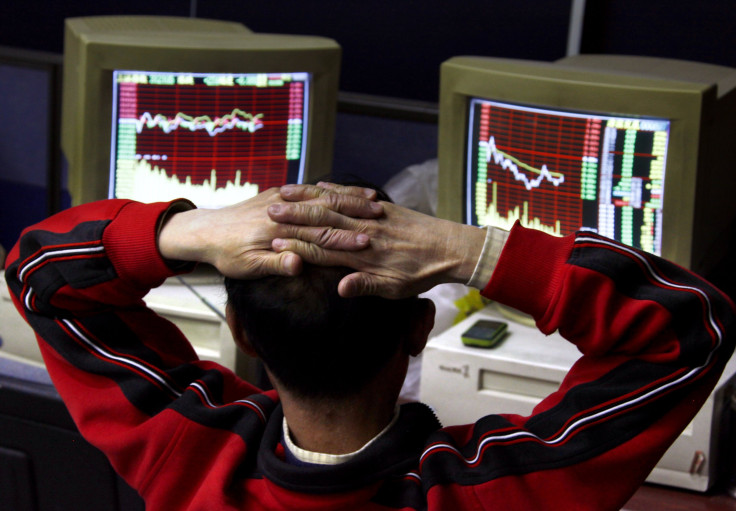China Punishes Stock Market ‘Rumor Mongers’, Journalist Apologizes On State TV For Damaging Investor Confidence With Fake Story

SHANGHAI -- With China’s stock market remaining volatile, the country’s regulators are continuing a crackdown on rumors, which they say are partly to blame for recent falls that have wiped more than 30 percent off the value of Chinese shares.
State media reported Monday that 197 people have been punished for spreading online rumors, relating both to the stock market and recent explosions at a chemical warehouse in the northern city of Tianjin, which killed at least 150 people, with 23 still missing. Meanwhile a journalist from one of China’s leading financial magazines has been shown on television confessing to spreading "fake information" and damaging investor confidence.
The reports appear to reflect official concern at the potential fallout from the plunge in China’s markets. The official Xinhua news agency said 165 social media accounts had been closed in the Chinese police’s “special campaign” against online rumors. It said the rumors included reports that a person had committed suicide because of the recent falls in the stock market, or that 1,300 people had died in the Tianjin explosions. Xinhua did not give details of the punishments handed down, but said those involved had expressed “repentance” for their “misconduct,” which had "caused panic, misled the public and resulted in disorders in stock market or society."
China said two weeks ago that it closed 50 websites for spreading rumors about the Aug. 12 Tianjin explosion, however this is the first official confirmation of reports of the closure of social media accounts.
Chinese state media have acknowledged that a failure by officials in Tianjin to release information about the explosion and casualties encouraged rumors, and Hong Kong’s South China Morning Post reported last week that China’s central government had encouraged some Chinese reporters to investigate local Tianjin officials, 11 of whom have now been detained for dereliction of duty.
However, the government has taken a more critical approach to Wang Xiaolu, a reporter with influential financial magazine Caijing. After being detained last week, Wang was shown on state TV Sunday apologizing for a story he published on July 20, in which he wrote that a government-linked finance company might be considering removing some of the billions of dollars it had invested in China's markets in an attempt to stabilize share prices following sharp falls. The story prompted a denial from China’s market regulator.
In the broadcast Wang was shown apologizing for what he said was a combination of “private information obtained through inappropriate channels” and his own “subjective judgment.” He said he regretted “seeking to create a sensation” through this “criminal act,” and publishing a report that had “brought big losses to the nation and investors at such a sensitive time."
Wang was shown asking judicial departments for leniency. It is not clear whether he or those "punished" in the anti-rumor campaign will be sent for trial. Two years ago China passed a law that threatened bloggers with jail if they wrote or re-posted rumors online. However, some legal experts have criticized the definition of rumors as vague, while others have said the showing of televised confessions -- which has become increasingly common in China in the past few years -- undermines the prospects of a fair trial for those involved. One well-known blogger who was shown on television confessing to publishing false information online two years ago was never actually charged.
Nevertheless David Bandurski, a researcher at the China Media Project at Hong Kong University, told International Business Times that Wang's confession was "an extremely worrisome case for China's press." He said Wang had "not been afforded proper legal protections" before making his televised remarks, adding that Wang's comments also implied that his detention was "not about facts... but about sensitivity." And Bandurski noted that Chinese share prices actually rallied for three days after Wang's article was published.
"We don't know what the facts are behind Wang Xiaolu's reporting for the July 20 story," he said. "But even in healthy, unfettered press environments journalists doing their best [sometimes] get things wrong. The proper correction comes through openness of information and reporting. This public confession will hang heavily around the neck of China's financial press."
The authorities’ attempts to crack down on what they say is illegal manipulation of the stock market have also led to the detention of the head of leading brokerage Citic Securities, Xu Gang, and three other top officials from the company. And Xinhua reported that Liu Shufan, an official from China’s stock market regulator, the China Securities Regulatory Commission (CSRC), had also been detained on suspicion of helping a company to obtain a market listing for a bribe worth hundreds of thousands of dollars, and for insider trading, which netted him a similar amount, as well as faking court documents relating to his mistress.
The report may confirm suspicions of some critics that China’s regulator does not always make decisions on listing companies -- many of them originally state enterprises -- based on sound economic fundamentals. The authorities have said they are taking steps to make such decisions more market-based. However some observers continue to call for more transparency at the CSRC and in decision-making related to China’s stock market.
© Copyright IBTimes 2024. All rights reserved.












